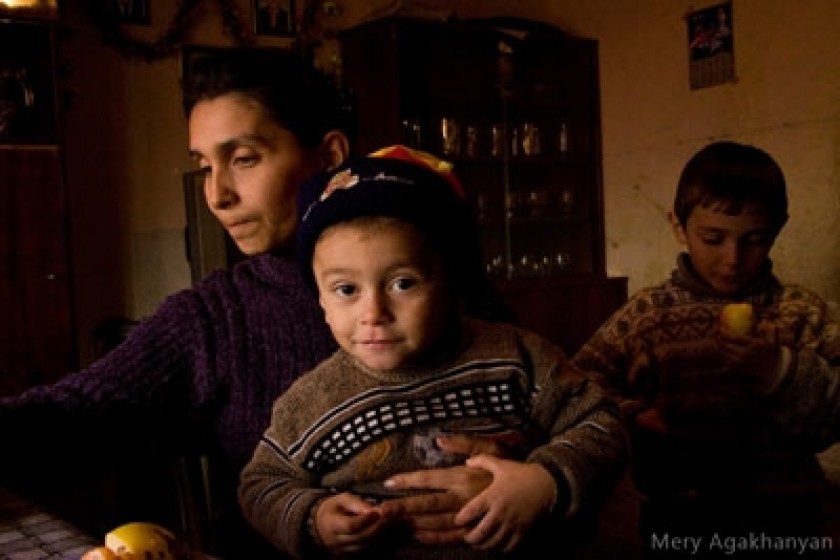
Large Family Living on the Border: "I հope we will not become homless"
The house where Susan and Karen Madatyan's family lives is not visible from the position of the Azerbaijani armed forces.
However the family, which consists of seven members, experiences the difficulties of life on the border. "Sometimes we hear the shots everyday", says Karen. He added that the area where they live is located in a pit and the bullets rush past above them.
Vazashen village residents of Armenia's Tavush region have other problems as well. The privatized lands are being attacked by Azerbaijan and thus the lands are not being cultivated. Vazashen residents are not peasants anymore.
The elder son of the family, Boris and two daughters Bella and Alla are the schoolchildren. Karo and David are little kids. The children bring happiness to the family, but at the same time the parents are concerned about their future. "Of course, first of all children bring happiness, to all the families…"
Karen is a disabled person; he has spinal problems. He receives a pension in the amount of 12,000 drams ($ 31). The state provides 53,000 drams ($ 137) as an allowance. The family consisting of seven members lives on 65,000 drams ($ 168) for the entire month. Each member of the family lives on 309 drams a day (80 cents).
"The children are modest and do not demand much", says Karen. In the evening, Susan serves up the dinner and everybody is curious what they will eat today. Usually, it is cereal or something similar.
-Did you turn to the state institutions for the help as a mother, who have many children?, Susan was asked.
-I did apply, but they say nobody asked you to give birth to so many children.
-I also turned to the regional administration, adds Karen with irony. -I explained that we live under difficult social conditions and there are five children in our family. I said that I am a disabled person and do not work. It all lasted for three months and I had collected two times the documents. At the end, they had said that the allowance had been sent; now I can receive it. I had received 20.000 drams ($ 52) and came back home.
 |
 |
 |
 |
 |
 |
One more time Madatsyan's family had addressed for the help, as Karen says. It was during the election campaign, when Serzh Sargsyan had become a president. Before retelling the story of this family first of all it is necessary to talk about the conditions in which Madatsyan's family lives.
From the day they got married till now, Karen and Susan live in the house of Karen's cousin. The cousin lives temporarily in Russia and allowed them to live in his place as long as he is absent. It is obvious that Karen should do something in the coming future to solve the problem of the accommodation as well.
"Some time ago, we wrote him a letter (Serzh Sargsyan – author). We received an answer that the land will be provided to us, as well as other privileges. There is one new organization, youth organization if I am not mistaken. They had visited our village, together with the head of the village to build a home for me. There are some areas with the already built foundations that were constructed by Kirghiz people after the earthquake. But the process had remained unfinished", recalls Karen.
In order to find out some information from the actual president, the former candidate, the family had applied Tavush regional administration and received the document that contains no important information. At the same time, Karen's cousin had made a decision to stay in Russia. "He now wants to sell the house at the price of 2.000 US dollars. If I will be able to find the means we will stay here, if not, then we need to move to some other place", says Karen.
However, it is impossible to collect money, when the only income is 65.000 drams ($ 168). In the yard of the house Karen is being engaged in the charcoal production. As he says, the additional income makes up 5-10.000 drams ($ 13 - $ 26). Karen explains that there is a villager who provides the wood and he makes the coal in his turn. Thus, the family has the firewood for free and can heat the home during the winter time.
To the question, what is the No.1 problem for the family, the spouses reply that it is the problem of the house. "We want to be sure that our children will have a place to live", says Susan.
Of course, the problem of accommodation remains the top-priority; however, there are other unsolved issues as well. The daughter Alla has a vision problem after a serious disease and she faces significant difficulties when she needs to write or read. The child was not even examined by the doctors, as the family knows that they will not be able to cover the expenses of the surgery.
How will it be possible to undergo the treatment? How they will live if they will stay homeless? How they will buy food and clothes? These questions which remain unsolved…
"I always say to the children that everything will be good. Under any circumstances, people should not lose hope", says the mother of this large family. Susan adds that she has always believed and still believes in the kindness of people.
 Videos
Videos Photos
Photos
Comments (1)
Write a comment